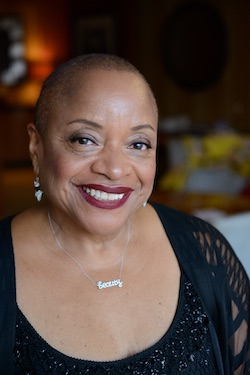Editor's note: Willis is unable to attend the Dec. 19 ceremony due to illness. Zainab Salbi will give the keynote address at both the morning and afternoon ceremonies.
Deborah Willis, PhD Cultural Studies ’03, University Professor and chair of the Department of Photography and Imaging at the Tisch School of the Arts at New York University, is the featured speaker at George Mason University’s 2 p.m. Winter Graduation ceremony Dec. 19, 2019, at EagleBank Arena.

Deborah Willis
Q: Your career covers a lot of ground. Do you consider yourself primarily an educator? Scholar? Photographer? Historian? Documentarian? Curator? Culturalist? Artist?
A: The overarching focus is education in varying formats as a curator, museum professional, historian and photographer. In my view each one informs the other. My work is informed with the history of storytelling, but also the idea of visual storytelling. My intention is to ground the history of African American culture, as well as the history of beauty, within a connection between the two.
Q: You’ve been quoted as saying, “What I learned at George Mason was how to have a different conversation about art.” How so?
A: Cultural Studies as a field broadened my conversation about art beyond description. One of my most powerful experiences as a curator and photographer is discovering artists and photographers who embrace the broad idea of art and social practice as they explore the complexities of life, from making visible stories of activism to transforming everyday experiences.
My images and writing have addressed critical questions in the broad areas of photographic history and popular culture. I have consistently focused my photography on themes such as beauty, race, and gender. I noticed assumptions are still made through the historical gaze when making assumptions about the black female body.
I see myself in the tradition of the role as an artist and scholar, in that I feel that not only must we create, we are also motivated to develop a more inclusive history of American photography by researching and writing about photography that has been overlooked.
Q: It was a revelation for you as a young girl when you first saw a book that had pictures of black people in it. What reaction do you hope people have when they observe your work that documents the African American experience?
A: As a black woman photographer, I use personal experiences to interrogate acts of injustices and moments in popular culture to introduce to new ways of viewing and discussing concepts that art matters. By telling my story, I hope to make possible for my viewers to visually consider the shared experiences of black women and in doing so see the humanity in all. Autobiography is essential to my work and I hope by creating a conversation around how black people are seen and how they are imagined we can begin to embrace our differences and similarities.
Q: What is the best piece of advice you ever received, personally or professionally, and how has that advice helped shape your career?
A: Know that there’s a place for you at the table…and/or behind the camera. Believe that you have a voice. Professor Robin D. G. Kelley writes that he has three words pinned on his desk: Love-Study-Struggle. These words are central to me as well. We must love the work that we are doing in pursuit of beauty and justice and in order to do so we must embrace the struggle and continue to study and participate in making our lives matter as well.
Q: Employers want to hire well-rounded graduates with a wide range of knowledge and skills. How do the arts and humanities factor into that equation?
A: The arts and humanities not only help us see and understand the world around us, they also--through a critical lens--envision the world as it could be. We must take every opportunity to shift the conversation to broader narratives and to consider hope for our future. We need to engage in more open conversations about a fair and equitable future that educates us all.
